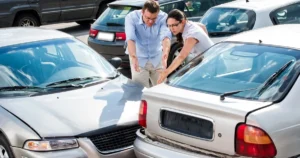 During the winter season, many roadways are filled with dangerous hazards and negligent drivers that may increase the risk of being in a serious car accident. Fortunately, there are steps that you can take to keep you and your family safe this winter season.
During the winter season, many roadways are filled with dangerous hazards and negligent drivers that may increase the risk of being in a serious car accident. Fortunately, there are steps that you can take to keep you and your family safe this winter season.
Below are several tips you may follow to help reduce the risks you face while driving during the winter season. If you or your loved one has been injured in a car accident caused by a negligent driver, contact Pfeifer, Morgan & Stesiak’s South Bend car accident lawyers. We will help you determine if you have a case that entitles you to pursue compensation from the at-fault driver.
Check the Weather Before You Leave
Before heading out, check the weather forecast for warnings of inclement weather patterns. If the weather is going to be bad, try to stay home or delay your travel. You can check local news stations, radio broadcasts, or websites or apps that provide an accurate forecast for your area.
If you do decide to venture out in bad weather, let someone know of your travel plans and your route in case you wind up in danger.
Prepare Your Car for Winter Weather
The harsh conditions of winter weather can be strenuous on your vehicle. Before you begin to travel in inclement weather, it is important to make sure your vehicle is ready to handle any ice, snow or other factors that may cause you to lose control of your vehicle.
At the start of winter season, consider performing the following maintenance on your vehicle:
- Checking your tires to determine if you need to replace them or install snow tires
- Replacing your windshield wipers, if necessary
- Filling your windshield fluid reservoir
- Filling your antifreeze/coolant
- Repairing your brakes, if necessary
- Inspecting your vehicle’s ignition, brakes, hoses, spark plugs, heating system and other critical components
- Checking your vehicle’s battery
- Checking for leaks or other necessary repairs
Before you begin to drive your vehicle, remember to scrape away any snow and ice that may have collected on its windshield, roof, mirrors or windows. Be sure to check your vehicle’s lights to make sure they are working properly, as well.
Know How to Avoid a Crash
If you attempt to drive in winter weather, it may help to familiarize yourself with what you should do in the event of a car accident. This includes how to anticipate and avoid being in a collision caused by inclement weather conditions or a negligent driver. Some ways to potentially avoid a crash include:
- Drive with your headlights on: Drivers often have limited visibility during inclement weather. Using your headlights and bright lights can increase visibility and help you see the roadway.
- Drive slowly: Remember that speed limits are intended for optimal conditions, not inclement weather. It is more difficult to control or stop your car on slick or snow-covered roads. You may need to stop or swerve to avoid an accident or hazards along the roadway. Traveling at slower speeds will help you to control your vehicle while traveling on iced-over roads.
- Increase your following distance: Avoid getting too close to other vehicles and give yourself extra space in case you need to stop suddenly. Increase your following distance to eight to 10 seconds.
- Maintain control of your vehicle: Do not use cruise control in icy or snowy weather: You will want to have as much control as possible.
- Be cautious: Be particularly careful around areas that become icy, including bridges and overpasses.
Avoid Distractions
Driving during winter weather requires your full attention. Avoid any distractions like eating, drinking or adjusting controls in your vehicle while driving. Do not check your cellphone and avoid all unnecessary distractions, including engaging in conversations with passengers or looking at objects or signs along the roadway.
If you are traveling with children, try to keep toys or games in your vehicle to keep them occupied during long-distance trips.
Drive Defensively
Be cautious around other drivers. Try to anticipate their actions and give them plenty of space. If a driver in front of you seems to be driving too fast or recklessly, slow down and try to give yourself some distance from the other vehicle so you will have enough time to avoid an accident.
Contact Our Attorneys Today
Although you may follow safe driving practices, there is always a chance that you may be involved in a car accident. If you or someone you love has been injured in an accident caused by a negligent driver, you may have a case that entitles you to compensation.
Pfeifer, Morgan & Stesiak’s reputable personal injury lawyers in South Bend offer free consultations to car accident victims. We will review your claim and help you understand which options may be available to pursue maximum compensation from the at-fault driver.
To get started, contact us today to find out if you have a case. We provide all of our services on a contingency fee basis. You only have to pay us if we recover compensation for you.
Call (574) 444-0741 to schedule a free, no obligation consultation.













